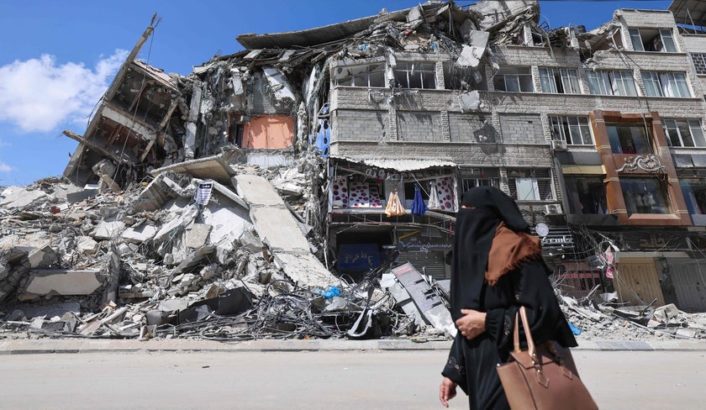What Palestinians have been asking for over the last 50 years – international actions to stop an aggressive occupier – were implemented for Ukrainians within seven days… A parallel demand for such actions to benefit Palestinians sounds like a stale joke…
By Jack Khoury, reposted from the Israeli newspaper Ha’aretz
The Palestinian leaders are following developments in Ukraine and biting their lips. “This is a time for remaining silent,” a senior Palestinian official told me. “Any statement or taking of a position will cost us dearly. Why annoy the United States and the West? We desperately need their help. And why open a front against the Russians and Putin?”
But despite the silence, neither Ramallah nor Gaza are concealing their frustration and disappointment given the different messages coming from the international community. The argument that the United States and Europe have double standards isn’t a new one. It arises every time there’s an international crisis where the “West” intervenes against tyrannical aggression. But the Ukrainian case brings into sharper focus the Palestinian struggle against the Israeli occupation.
What Palestinians have been clamoring for over the last 50 years was quickly internalized by the West in Ukraine. Decisions to mobilize for stopping an aggressive occupier, imposing economic sanctions, closing airspace and boycotting sports and cultural events were implemented within seven days. Ukrainians will receive weapons, ammunition, intelligence and technology that could wear down Vladimir Putin and the Russians.
A parallel demand to implement resolutions by the UN Security Council and the wider international community for the benefit of the Palestinians sounds like a stale joke. International law is good for lectures. Any initiative to advance a significant step at the United Nations, mainly at the Security Council, encounters an American veto. Any call for condemnation or sanctions encounters cries of antisemitism or “a prize for terror,” with accusations that this will undermine efforts at a two-state solution.
Many Palestinians side with Putin not because they support tyranny or have sadistic feelings as an occupied people but out of an understanding that the “enlightened” world no longer embraces justice, democracy and human rights. Instead, it acts based on security and economic considerations. If you’re strong, we can talk. If you’re weak, we’ll trample you. That’s the equation.

In Ramallah they don’t have to go all the way to the Kremlin to find proof of this. It’s enough to visit the office of the Hamas leader in Gaza, Yahya Sinwar. This man, who in Israel’s eyes is the leader of a murderous terrorist organization, receives more attention than all the suits and ties surrounding President Mahmoud Abbas at the Muqata.
Israel has invested more military and intelligence efforts in Gaza than in the West Bank over the past 20 years. Every missile launched from Gaza rattles public opinion; the threat on greater Tel Aviv from the south is much larger than from across the fence a few miles east of the city.
For 25 years, the Palestinian leaders, mainly Abbas, have chosen what may be perceived as the “good” approach. There have been four presidents in Washington, at least three of them supporting a two-state solution. But the dream is fading. The claim that any deal requires a willingness on both sides is being shattered in front of our eyes.
Joe Biden’s speech last week against the occupation of another people and against Russian aggression can be easily embraced by Palestinians, but everybody knows that nothing will happen here. The world, touched by pictures of light-skinned, blue-eyed refugees trudging toward the border of a neighboring country, remains indifferent to the sight of a darker woman in a hijab walking through ruins in Gaza City.
Jack Khoury is a writer for Ha’aretz
RELATED:





